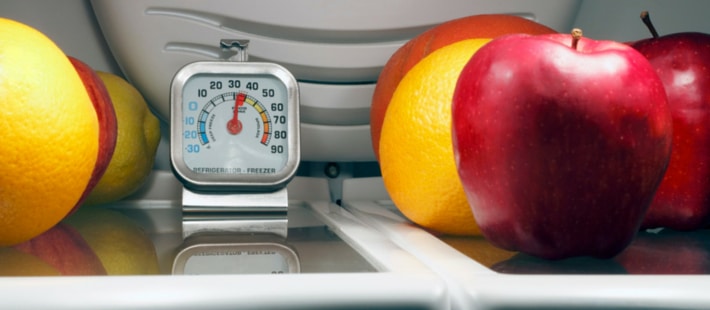
Food Safety and Refrigeration
Refrigeration is essential to food safety, but do you know what life would be like without its cooling graces? Read on for a history of the cool invention, how to have a safe and bacteria-free refrigerator, the correct methods to store foods and more.
The History of Refrigeration
Refrigeration is said to date back to the Stone Age, or Tertiary Period, when people found that meat would last longer without decay when it was stored in a cool place like a cave or packed in snow.When the industrial and mechanical ages came about, people would harvest or manufacture and transfer ice from one location to another. This would ensure that food was refrigerated all year. Later, chemicals like sodium nitrate and potassium nitrate were added to water to make the water cooler, and thus keep foods cooler longer. Mechanical refrigeration (a compressor with refrigerant) that is used today was introduced at the end of the 19th century. The Regulatory Clean Air Act of 1996 changed the type of refrigerant required for use from freon to HFC 134a, which was found to be less harmful to the ozone.
Importance of Refrigeration
Refrigeration is needed to slow bacterial growth on foods before we can eat them. Bacteria exist in the soil, air, water, and foods that we eat and grow rapidly in certain environments like warmth. The “Danger Zone” of food bacteria is between 40 and 140 degrees Fahrenheit.
Types of Bacteria in Refrigerated Foods
Foodborne illness is developed in pathogenic bacteria. This bacteria grow rapidly in the Danger Zone but don’t generally affect the taste, smell or appearance of foods, so be careful as it can be nearly impossible to detect! Spoilage bacteria grow at lower temperatures, like in the refrigerator, and can be detected by a rotten smell or visible mold growth. However, food left on a counter may look fine but could be dangerous to eat. Listeria thrives in cold temperatures as well and could multiply and cause illness over time.
Safe Refrigerator Temperature
A freestanding appliance thermometer is one of the most cost-effective ways to keep your refrigerator and freezer at the correct temperatures. As a general rule, people should try to keep their refrigerator at or below 40°F and the freezer at 0°F. Checking these thermometers two or three times each week will ensure your food is being stored properly and safe to eat.
How to Store Food Safely: Food Storage 101
As stated, you should keep your refrigerator at 40 degrees Fahrenheit and your freezer at 0 degrees. Place cooked or hot food directly in the refrigerator to keep fresh and be sure to cover the food containers to retain moisture and prevent odor transferral. Divide large pots of soups, stews and even cuts of meat into separate containers to ensure proper refrigeration. Also, be sure that meats are wrapped tightly to prevent raw juices from leaking and contaminating other foods. Use fruit, vegetable and cheese compartments to ensure the correct storage and freshness of foods. Never store perishable foods likes eggs and dairy on the door of your refrigerator and keep the door shut as much as possible.
Refrigeration Cleanliness and Odor Removals
Keeping your refrigerator clean is an essential step in food safety, and shouldn’t be overlooked. Make a habit of tossing out any perishable or old foods in your refrigerator. A general rule for cooked leftover food saving is to keep it no longer than four days, and one to two days for raw poultry and ground meats. Have trouble with an odor in your refrigerator? Place an opened box of baking soda on a shelf. Also, avoid using harsh chemicals to clean the inside of your fridge. Instead, stick to warm, soapy water and rinse with clean water. If a stubborn smell just won’t leave your fridge, try using equal parts vinegar and water to wash it. Other hacks to try to remove odors include scrubbing with a water and vinegar rinse, stuffing your unit with rolled newspapers to absorb the odor, sprinkling fresh coffee grounds in the bottom the unit, or try a commercial product available at most hardware stores.
Contact A Plus Air Conditioning and Refrigeration for Questions About Food Safety and Refrigeration
Refrigeration is necessary to serve safe food, especially here in hot and humid Florida. Since your business relies so heavily on your refrigeration, give it the love it deserves with preventive commercial refrigeration maintenance from A+ Air Conditioning and Refrigeration.
We provide air conditioning and refrigeration service in many areas of Central Florida including Gainesville, Ocala, Alachua, Bronson, Chiefland, Palatka, Cedar Key, Trenton, Starke, High Springs and Waldo. With 18 years of experience, we repair and service the following refrigeration equipment for commercial spaces:
– Walk-in Coolers & Freezer Systems
– Reach-in Coolers & Freezers
– Commercial Ice Machines
– Commercial Exhaust Hoods
Contact us today to schedule service online or call us now at 352-608-5019.



